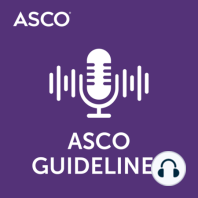15 min listen

Treatment of Patients with Early-Stage Colorectal Cancer Resource-Stratified Guideline
FromASCO Guidelines
Treatment of Patients with Early-Stage Colorectal Cancer Resource-Stratified Guideline
FromASCO Guidelines
ratings:
Length:
11 minutes
Released:
Feb 25, 2019
Format:
Podcast episode
Description
An interview with Dr. Manish Shah from New York Presbyterian Weill Cornell Medical Center on the ASCO Resource Stratified Guideline which covers treatment of patients with early-stage colorectal cancer. To read the full guideline go to www.asco.org/resource-stratified-guidelines The purpose of this podcast is to educate and to inform. This is not a substitute for professional medical care and is not intended for use in the diagnosis or treatment of individual conditions. Guests on this podcast express their own opinions, experience, and conclusions. The mention of any product, service, organization, activity, or therapy should not be construed as an ASCO endorsement. Hello, and welcome to the ASCO Guidelines Podcast series. My name is Shannon McKernin. And today, I'm interviewing Dr. Manish Shah from New York Presbyterian Weill Cornell Medical Center, senior author on "Treatment of Patients with Early-Stage Colorectal Cancer: ASCO Resource-Stratified Guideline." Thank you for being here today, Dr. Shah. Thank you, it's a pleasure and honor to be here. So first, can you give us a general overview of what this guideline covers? Yes, absolutely. So the "Treatment of Patients with Early-Stage Colorectal Cancer" is a resource-stratified guideline. And it focuses on the management of patients with early-stage colon cancer. It's different than the surveillance and screening guideline that was written simultaneously for ASCO as another resource-stratified guideline. We felt that this was a big enough topic that we should keep it separate. So it really talks about the management of pre-malignant lesions, as well as early-stage colon cancers, as well as rectal cancers. And the other aspect of this is that we really focused on how the guideline may apply in settings where there-- they don't have maximal resources, so basic or limited settings as well. So I would like to talk a little bit about how the guideline was created, because I think that's an important aspect. And it distinguishes it from typical other ASCO Guidelines. So the management of colon cancer or colorectal cancer, there's a lot of literature on this. And there are several guidelines that have been produced by colorectal cancer societies, or surgical societies, or from other countries like the EORTC, or Japan, or Korea, or even the UK. So in fact, there were, I think, 30 to 40 different guidelines that we reviewed. And we felt that, instead of doing a new literature search to kind of rehash much of the same information, we reviewed all the guidelines for certain quality measures to then select a handful of guidelines that we would use as the reference for each of our key questions or key points. And this was done in a formal process, the first by ASCO and Sarah, who was the ASCO staff who wrote the guideline, along with the members of the guideline panel. And in this process, I think that we have a pretty comprehensive guideline that covers the questions with the best evidence available. So what are the key recommendations of this guideline? Yeah, so we addressed some several questions with regard to key recommendations. The first question, for example, was, what's the optimal treatment for patients with colon cancer that would be clinical stage 1 through 3c? And we distinguish that from a non-obstructing cancer to obstructing cancers as well, because the management would be very different. And what we really sort of focused on is that these patients should have resection following oncologic principles. Then ideally, they should have an en bloc resection by a surgical oncologist to give the patients the best chance of care. But I think what's unique to resource-stratified guidelines, and what we have to do is sort of highlight the care that would be achieved in settings that have less resources. So a non-obstructing colon cancer in a basic setting should still have surgery and should still undergo an en bloc resection following standard oncologic principles. So that
Released:
Feb 25, 2019
Format:
Podcast episode
Titles in the series (100)
Management of Immune-Related Adverse Events Guideline: An interview with Dr. Bryan Schneider of the University of Michigan on the ASCO clinical practice guideline to increase awareness, outline strategies, and offer guidance on the recommended management of immune-related adverse events in patients... by ASCO Guidelines